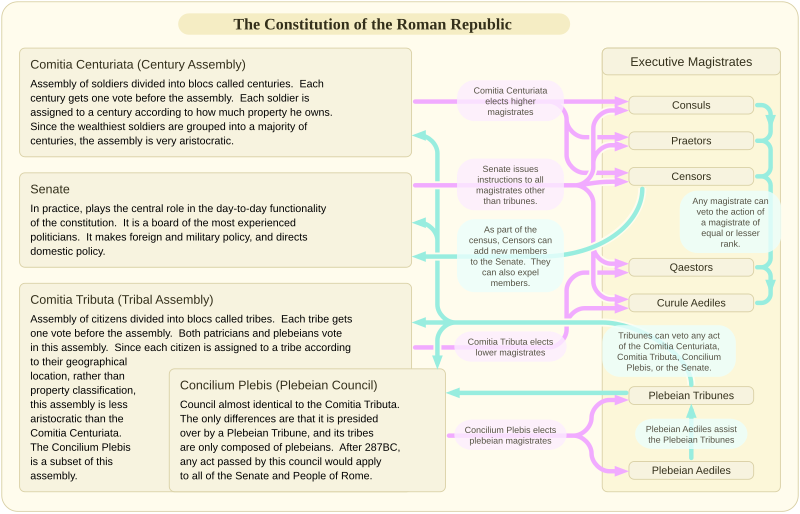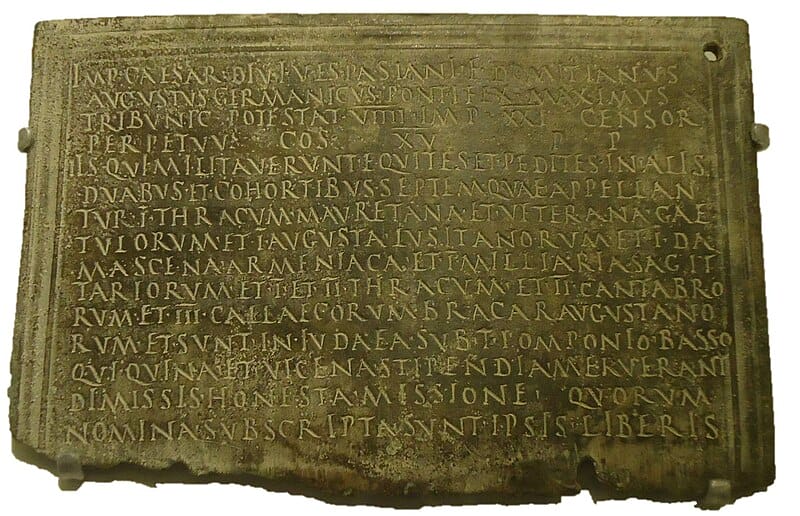Roman citizenship was a prized possession that conferred numerous privileges and legal rights upon its holders. The concept of citizenship evolved over time, and its legal and social aspects changed with the changing needs of the Roman state.

Source: Frank Waldschmidt-Dietz, CC BY-SA 4.0 https://creativecommons.org/licenses/by-sa/4.0, via Wikimedia Commons
The historical development of Roman citizenship is a complex and fascinating subject that spans several centuries. At first, only the patrician class had citizenship in Rome, but over time, other groups like the plebeians, or Latins, got that privilege. This process of granting citizenship was often driven by political motives and mirrored the shifting power dynamics within Roman society. The legal and social aspects of citizenship evolved as well, with various laws and decrees introduced to manage citizenship and its associated privileges.
Key Takeaways
- Roman citizenship was a valuable asset that provided its holders with numerous legal and social benefits.
- The concept of citizenship evolved over time and reflected the changing needs of the Roman state.
Historical Development of Roman Citizenship
Roman citizenship was a highly coveted status in Ancient Rome, conferring upon its holders a range of legal and social privileges. The following subsections will explore the historical development of Roman citizenship, from its early origins to the universal citizenship granted by the Edict of Caracalla.
Early Rome and the Latin Rights
In the early days of Rome, citizenship was restricted to the patrician class, who held a monopoly on political power. However, as the city grew and expanded, the Roman state began to grant citizenship to other groups, such as the Latins. The Latin Rights were a set of legal privileges granted to the inhabitants of the Latin League, a confederation of cities in central Italy that had allied with Rome. These rights allowed the Latins to trade with Rome, intermarry with Roman citizens, and participate in Roman military campaigns.
Expansion and the Socii
As Rome continued to expand its territory, it began to incorporate new groups into its social and political system. These groups were known as the Socii or allies, and they were granted a range of legal privileges in exchange for their loyalty to Rome. The Socii were not Roman citizens, but they were granted a form of partial citizenship known as the Latin Right of the Peregrinus. This allowed them to conduct business in Rome and to serve in the Roman army.
10 Privileges
1. Right to Vote (Ius Suffragii)
This right, known as ius suffragii, was granted to all male citizens who had reached the age of 25 and who met certain property qualifications. This was a critical aspect, as it allowed citizens to participate in the election of officials who governed the city.

Source: Anihl, CC BY-SA 2.5 https://creativecommons.org/licenses/by-sa/2.5, via Wikimedia Commons
While the right to vote was a mark of Roman citizenship, the voting system was heavily biased in favor of the wealthy. In the Comitia Centuriata, for example, votes were counted by “centuries,” and the wealthiest classes controlled the majority of them.
By the time of the late Republic and into the Empire, the power of assemblies diminished as emperors consolidated authority. Though citizens still technically had voting rights, real political power increasingly shifted from the assemblies to the emperor and his appointed officials.
2. Right to Hold Public Office (Ius Honorum)
This right, known as ius honorum, was granted to citizens who had reached the age of 30 and who had held certain lower offices. The right to hold public office was a key way in which citizens could exercise political power and influence the direction of the Roman government.
For many Roman citizens, particularly those from the elite patrician and equestrian classes, holding public office followed a structured political career path known as the cursus honorum. This progression of offices included both military and civilian roles, each carrying increasing levels of authority and responsibility.
The right to hold public office was initially limited to the patrician class, but over time, especially after the Conflict of the Orders, plebeians (commoners) gained the right to run for most offices. However, offices remained dominated by the nobles – a class of wealthy, influential families, both patrician and plebeian.
During the early Empire, particularly under Augustus and his successors, the power of elected offices diminished as the emperor absorbed more authority. Offices like consul still existed, but the emperor often appointed individuals to these roles, and real political power rested with the emperor. Holding public office became more ceremonial than genuinely influential, though it still brought prestige.
3. Legal Protections (Ius Provocationis)
Roman citizenship also provided certain legal protections to citizens. One of the most important of these protections was the right of ius provocationis, which allowed citizens to appeal to a higher authority if they felt that their legal rights had been violated. This right was a critical safeguard against abuses of power by magistrates and other officials.
Roman citizens were entitled to a legal trial before being punished for any crime. Trials were often held in public, allowing citizens to defend themselves before a magistrate or in the Roman courts.
A key protection for Roman citizens was the right to appeal (provocatio) to the people, or later to the emperor if they felt they had been wronged by a magistrate’s decision. This appeal process acted as a safeguard against the abuse of power by local officials.
Roman citizenship offered legal protections even when traveling or living abroad in the provinces. A Roman citizen could demand to be tried in a Roman court rather than in local courts. This was particularly important for those living in or traveling through distant regions of the Empire, as it prevented mistreatment by provincial governors or foreign authorities.
4. Right to a Trial (Ius Iudicium)
Citizenship also guarantees the right to a fair trial. This right, known as ius iudicium, ensured that citizens could not be arbitrarily punished or executed without due process of law.

Source: TimeTravelRome, CC BY 2.0 https://creativecommons.org/licenses/by/2.0, via Wikimedia Commons
Trials in Rome were often held in public forums, especially in serious criminal cases. This public nature was designed to ensure transparency and fairness, as the presence of the public acted as a check on the potential abuses of magistrates.
A critical aspect of the right to a trial was the protection it afforded citizens against arbitrary punishment or execution without due process. No Roman citizen could be summarily punished without first being tried according to law.
Roman citizens were protected from certain humiliating or brutal forms of punishment, such as crucifixion or torture, which were often reserved for non-citizens and slaves. This legal protection was directly tied to the right to a trial; no citizen could be subjected to such punishment without due legal process.
5. Property Rights (Ius Commercii)
Roman citizenship also conferred certain property rights on citizens. This included the right to own and transfer property, as well as the right to engage in commercial transactions. The right to engage in commerce was a critical aspect of Roman economic life, and it allowed citizens to participate in the vibrant trade networks that crisscrossed the Mediterranean world.
The Ius Commercii granted Roman citizens the legal right to own land, homes, businesses, and other forms of property. Ownership was protected by Roman law, ensuring that citizens could defend their property from theft, fraud, or unlawful seizure.
The Ius Commercii was not just about economic rights – it was also a key element of social status in the Roman world. Wealth, particularly land ownership, was a major indicator of social standing. Many of Rome’s elite political and military leaders came from land-owning families who used their property to build wealth and influence. Women who were Roman citizens also had limited property rights. Although they typically needed a male guardian (father or husband) to oversee major transactions, women could own and inherit property, especially if they were widows or unmarried.
6. Right to Marry (Ius Connubii)
Another important aspect of Roman citizenship was the right to marry. This right, known as ius connubii, allowed citizens to enter into legal marriages with one another. The right to marry was a critical aspect of Roman family life, and it helped to ensure the continuity of the Roman gens and the transmission of property and other rights from one generation to the next.
As Roman citizenship expanded throughout the empire, the Ius Connubii extended to newly granted citizens. This integration helped solidify Roman law and customs across diverse regions, contributing to the cohesion and stability of the Empire. The Ius Connubii was a crucial privilege of Roman citizenship that allowed individuals to enter into legally recognized marriages, ensuring the legitimacy of children, securing inheritance rights, and maintaining social structure. It had significant implications for property, social status, and family life, making it an essential aspect of Roman legal and social systems.
7. Tax Exemptions
Roman citizens benefited from several tax exemptions and privileges, including relief from certain taxes and access to specific government benefits. These incentives were designed to promote civic involvement and to recognize citizens for their contributions to the state.
Roman citizens were often exempt from certain provincial taxes and levies that were imposed on non-citizens. This exemption made citizenship highly desirable for those living in the provinces. In addition to general tax exemptions, Roman citizens could be exempt from specific public duties and expenses. For example, they might be relieved from local obligations like maintaining public infrastructure or contributing to local festivals, which were required of non-citizens.
In some cases, Roman citizens, particularly those of high status or with influential connections, could be exempt from certain military-related taxes or contributions, although this was less common and more dependent on individual circumstances.
8. Military Service (Ius Militiae)
Roman citizenship also conferred certain military obligations and privileges on citizens. This included the right to serve in the Roman army and to receive certain types of military benefits and rewards. Military service was a critical aspect of Roman citizenship, and it helped to ensure the security and stability of the Roman state.

Source: אור פ – אור פ at Hebrew Wikipedia., CC BY-SA 3.0 https://creativecommons.org/licenses/by-sa/3.0, via Wikimedia Commons
Roman citizens were eligible to serve in the Roman army, which was a key component of their citizenship rights and obligations. This eligibility was tied to the concept of civitas and was essential for maintaining the security and expansion of the empire. By the late Republic and throughout the Empire, Rome maintained a professional standing army composed mainly of Roman citizens. Military service was a prestigious role, and soldiers could expect a career with regular pay, benefits, and opportunities for advancement.
Veterans of the Roman army often received pensions or land grants upon completing their service. This reward provided financial stability and helped integrate former soldiers into civilian life, offering them a stake in the empire’s success. Serving in the Roman military elevated a citizen’s social status. Military service was respected and could enhance a soldier’s reputation and influence, both during and after their service.
Ius Militiae was a fundamental aspect of Roman citizenship, reflecting the dual nature of military service as both a duty and a privilege. It provided significant benefits, such as pensions, social status, and opportunities for advancement, while also imposing responsibilities and requirements on those who served. The system of military service was integral to the functioning and expansion of the Roman Empire, reinforcing the connection between citizenship and imperial power.

Source: Erfgoedhuis Zuid-Holland, CC BY 4.0 https://creativecommons.org/licenses/by/4.0, via Wikimedia Commons
9. Immunity from Certain Punishments
Roman citizenship provided certain immunities and protections from certain types of punishment. For example, citizens could not be subjected to certain types of corporal punishment or torture. All of this was designed to ensure that citizens were treated fairly and justly under the law.
This was a key privilege of Roman citizenship, offering protection from the harshest forms of legal punishment and reflecting the broader legal and social advantages of being a Roman. This immunity was tied to the principles of fair trial and dignified treatment, reinforcing the status and rights of Roman citizens within the empire.
10. Inheritance Rights (Ius Legis Actionis)
Citizenship in Rome came with important inheritance rights, allowing citizens to inherit property and assets from family members and relatives. This right was crucial to Roman family life, as it ensured the continuity of the Roman gens and facilitated the transfer of property and rights from one generation to the next.
Roman citizens had the right to create legally binding wills (testamenta) specifying how their property should be distributed upon their death. This right was crucial for determining the distribution of estates and ensuring that the deceased’s wishes were honored. Wills had to meet specific legal requirements to be valid, including being made in the presence of witnesses and adhering to established formats. Roman law recognized various forms of wills, including oral wills (nuncupative) and written wills (scriptum). Written wills were generally preferred and offered more legal security.
People Also Ask:
What were the qualifications necessary to obtain Roman citizenship?
During the Republic era, Roman citizenship was not granted easily. To become a Roman citizen, one had to be born to a citizen parent or obtain citizenship through a process called naturalization, which required residency in Rome for a certain period of time, military service, and other qualifications.
What advantages did individuals gain from holding Roman citizenship?
Roman citizenship conferred many advantages, including the right to vote, the ability to hold public office, and legal protections. Citizens also gained access to certain privileges, such as exemption from certain taxes and the right to a trial before a Roman court.
How did the status of Roman citizenship influence one’s legal rights?
Roman citizenship was a highly prized status that provided many legal rights and protections. Citizens enjoyed the right to a fair trial, protection from torture, and the right to appeal a verdict. They were also exempt from certain forms of punishment, such as crucifixion.
In what ways could a non-Roman be granted citizenship during the Republic era?
During the Republic era, non-Romans could be granted citizenship through a process called naturalization. This process required residency in Rome for a certain period of time, military service, and other qualifications. In some cases, citizenship was granted as a reward for service to the Roman state.
What role did Roman citizenship play in early Christian history?
Roman citizenship played an important role in early Christian history. The Apostle Paul, for example, was a Roman citizen, which gave him certain legal protections and allowed him to travel freely throughout the Roman Empire. Roman citizenship also helped to spread Christianity throughout the Empire, as citizens could freely practice their religion without fear of persecution.
How was proof of Roman citizenship established and verified?
Proof of Roman citizenship was established through various documents, such as birth certificates and citizenship papers. These documents were stored in archives and could be produced as evidence of citizenship. In some cases, witnesses could also testify to an individual’s citizenship status.
Hello, my name is Vladimir, and I am a part of the Roman-empire writing team.
I am a historian, and history is an integral part of my life.
To be honest, while I was in school, I didn’t like history so how did I end up studying it? Well, for that, I have to thank history-based strategy PC games. Thank you so much, Europa Universalis IV, and thank you, Medieval Total War.
Since games made me fall in love with history, I completed bachelor studies at Filozofski Fakultet Niš, a part of the University of Niš. My bachelor’s thesis was about Julis Caesar. Soon, I completed my master’s studies at the same university.
For years now, I have been working as a teacher in a local elementary school, but my passion for writing isn’t fulfilled, so I decided to pursue that ambition online. There were a few gigs, but most of them were not history-related.
Then I stumbled upon roman-empire.com, and now I am a part of something bigger. No, I am not a part of the ancient Roman Empire but of a creative writing team where I have the freedom to write about whatever I want. Yes, even about Star Wars. Stay tuned for that.
Anyway, I am better at writing about Rome than writing about me. But if you would like to contact me for any reason, you can do it at contact@roman-empire.net. Except for negative reviews, of course. 😀
Kind regards,
Vladimir
